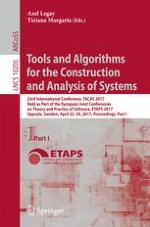2017 | OriginalPaper | Chapter
Learning Symbolic Automata
Authors : Samuel Drews, Loris D’Antoni
Published in: Tools and Algorithms for the Construction and Analysis of Systems
Publisher: Springer Berlin Heidelberg
Activate our intelligent search to find suitable subject content or patents.
Select sections of text to find matching patents with Artificial Intelligence. powered by
Select sections of text to find additional relevant content using AI-assisted search. powered by
